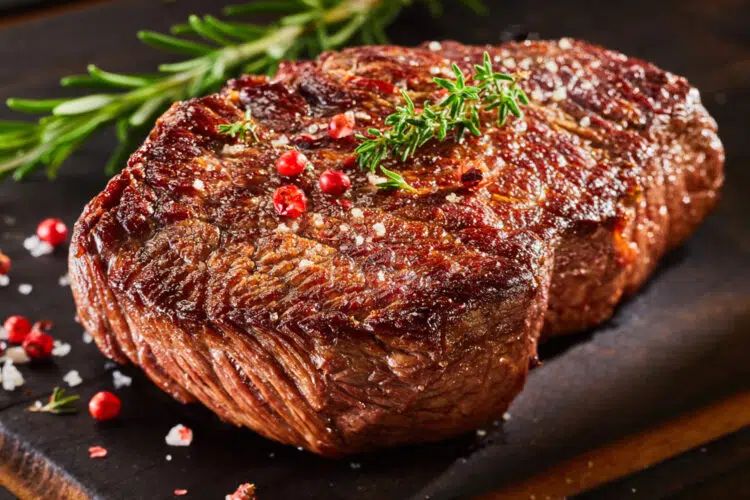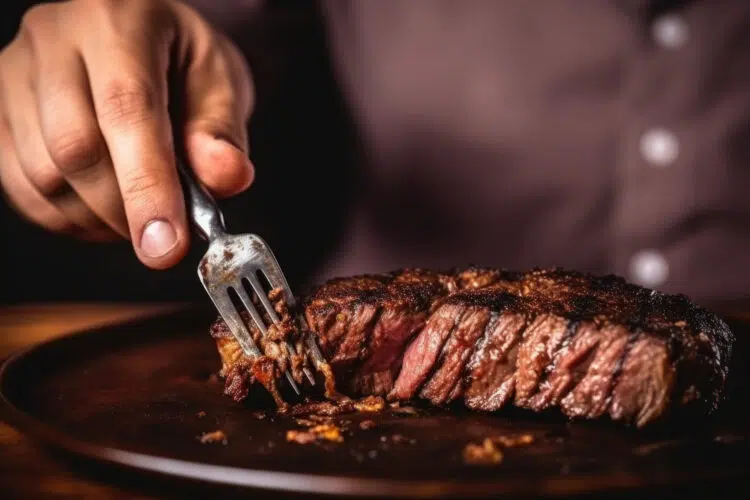The fitness space is ever-evolving, with new diet and nutrition programs going viral every few months. While most of these new trends are nothing more than fads, some fitness protocols really hold their own and can be incredibly effective for a physique and overall health transformation.
I recently stumbled upon the Lion Diet and was really impressed with the transformation stories and results I saw. It is a meat-based elimination diet designed to help you identify which foods might be negatively affecting your health.
The Lion Diet was created in December 2015 by Mikhaila Fuller (previously Peterson), a lifestyle blogger and podcast host, to improve her mental and physical health. Fuller claims the Lion Diet can boost energy levels, mental health, and symptoms of digestive and autoimmune conditions.
After hours of contemplating, I decided to try the Lion Diet for four weeks to check if it could improve my body composition, energy levels, and blood markers. In this article, I share all the details of this 30-day challenge along with the results.
Preparing for the Lion’s Den
The Lion Diet is a variation of a carnivore diet, but only more restrictive. This diet only permits you to eat meat from ruminant animals, including cows, sheep, and deer, salt, and water. While meat is your primary source of calories, salt provides vital minerals for electrolyte balance and enhances the taste of meat. Water ensures you don’t run the risk of dehydration.
Remember, you can’t eat meat from nonruminant animals (bacon, ham, pork chops, rabbit meat), poultry (chicken, duck, goose, turkey, goose), seafood (salmon, trout, shrimp), or dairy products (milk, yogurt, cheese) on this diet.
Not only that, but fruits, vegetables, legumes, nuts, grains, nuts, seeds, fats, and other beverages are off the table as well.
Limiting your diet to these specific foods can help you sustain your body, but sticking to it for an extended period can lead to nutrient deficiencies.
While you must completely abstain from these foods initially, you can slowly reintroduce them to your diet as symptoms of your health condition subside.
Since I didn’t have any health conditions when I started this diet program, I decided to stick to the conventional Lion Diet for the entire four weeks.
Research and Preparation
I am always very careful when starting an overly restrictive diet. You don’t want to start a new diet only to see your gains perish and your health deteriorate.
I calculated my total daily energy expenditure (TDEE) and designed a suitable meal plan to ensure I hit my calorie goals. Remember, achieving your carbs goals on an overly restrictive diet like the Lion Diet is almost impossible.
After consulting my doctor, I added specific supplements to my daily regimen to avoid potential deficiencies. (I told you I’m super careful with these things.)
Finally, I crafted a 30-day meal plan that included a variety of meats to keep my diet exciting and prevent monotony and taste fatigue.
Mental and Emotional Fortitude
Make no mistake, the Lion Diet is as much a mental challenge as it is physical. You must also explain to your family why you are switching to eating only ruminant meat. Honestly, I had a hard time convincing my wife on this radical diet.
The First Week: Roaring into the Unknown
While I had expected that the initial transition would be smooth since I was still getting to eat meat, I had underestimated how much I would crave the good old rice and bread. I had to develop a coping mechanism to ensure I didn’t let my cravings run wild. What was it, you ask? A set of push-ups done to failure.
That said, going cold turkey on the carbs sent my body into a state of shock, and the lack of glycogen stores led to fatigue, headaches, and constant cravings. Also, my stomach wasn’t ready for the sheer volume of meat I started consuming on the first day of this diet. I faced considerable bloating and discomfort during the second and third days of the first week.
My body started adjusting to the Lion Diet on the final few days of the first week. My energy levels were back to normal levels, my mental clarity and focus improved, and the constant hunger pangs were behind me.
Notably, my breath took a distinct, meaty odor during this same time, and I experienced a slight dip in my endurance. My body still hadn’t adapted to using fat as its primary fuel source.
Weeks Two & Three: Adapting to the Carnivore Lifestyle
Listen, protein farts are an unescapable reality on the Lion Diet, and there is no way to escape it. While the bloating and gas were incredibly high during the first week, my digestion adapted in the second week, and my gut felt remarkably calm.
The biggest surprise and relief to me was that I didn’t lose muscle tissue during the first three weeks. This was also reassuring as this meant I wouldn’t lose my hard-earned muscle if I stuck to the same diet for another week.
Also, by Week Three, I avoided eating out with new people. It was too much of a hassle to explain to people what I was doing and why.
However, I also started questioning the sustainability of this diet at this point, as my cravings for familiar foods peaked, and I began to miss the vibrant flavors and textures of plant-based foods. Learning to navigate these temptations was one of the biggest challenges of this diet.
The Final Stretch: Triumphs and Tribulations
Although my energy levels were back to normal mid-diet, they started to plateau during the final week. On some days, I felt full of energy; on others, I didn’t feel like leaving my bed. This, to me, is a big red flag for a diet.
However, my mental clarity and digestive health were adjusted to the diet, and I continued to function like a well-oiled machine. Honestly, at this point in the diet, I was just waiting for the challenge to end so I could have a tangy fruit and a big slice of pizza.
The Shocking Results: Unveiling the Truth
Here are the details of the results I got from following this diet for 30 days:
Weight Loss & Body Recomposition
Even though I aimed to stick to my maintenance calories for the four weeks, I lost five pounds of body weight. This was a welcome change as it improved my overall body composition and physique aesthetics.
The Lion Diet can boost your metabolism, helping you burn calories throughout the day, even when you are not physically active.
Related: Body Recomposition Calculator.
Better Energy Levels
Typically, my energy levels go through peaks and valleys throughout the day. However, during the majority of this challenge, I felt like the Duracell bunny — my energy levels were constant, and my performance was at its peak. Better programming can improve these results even further.
Mental Clarity and Focus
Again, this wasn’t a benefit that I was expecting when I started this challenge. However, after the initial adjustment phase, I felt sharper and more focused throughout the day.
Improved Sleep Quality
Better sleep was the first benefit I noticed after starting the Lion Diet. I was falling asleep faster and waking up feeling refreshed. People around me told me my skin quality was improving, and I didn’t have a single acne for 30 days.
Blood Work
I get blood work done every year, and this time around, it coincided with the Lion Diet. The reports were nothing short of amazing. My cholesterol levels improved, triglyceride levels lowered, and blood sugar levels were stable.
Weighing the Scales: Pros and Cons of the Lion Diet
Are you contemplating starting the Lion Diet? Here are a few things you should consider:
Pros:
Convenience & Weight Loss
One of the biggest advantages of following the Lion Diet is that the limited food options make sticking to a nutrition regime incredibly more convenient. Plus, this restricted diet can be incredibly effective for losing weight.
Simplicity
More often than not, we end up including a lot of fancy food sources in our otherwise healthy diet. An elimination diet like this forces you to simplify your eating habits. Besides improving your gut flora over the long term, it can also help limit decision fatigue and focus on high-quality foods.
Discipline
Eating a particular type of meat for a particular period is no joke. It requires immense discipline and mental fortitude. The longer you stick to this diet, the more it’ll reinforce the importance of setting clear goals.
Improved Blood Sugar Levels
Since this diet plan contains no refined carbs or other sugar sources, it can help stabilize blood sugar levels. People with diabetes or insulin resistance might experience improved glycemic control on this diet.
Reduced Inflammation
Some people report a significant reduction in inflammation markers after switching to the Lion Diet. While I didn’t notice any such improvement, it can vary for each individual.
Cons:
Nutrient Deficiencies
Eliminating entire food groups from your diet can lead to nutrient deficiencies, and the high saturated fat intake can negatively impact your heart health.
While I didn’t experience any major health issues, the potential for nutrient deficiencies on diets like these is very high, and you must consult a healthcare professional before starting an elimination diet.
Electrolyte Imbalance
This was one of my biggest concerns before starting the Lion Diet. The limited sodium intake associated with this diet significantly increases the risk of electrolyte imbalances and dehydration.
I experienced a few mild muscle cramps during the first week of the Lion Diet as my body was still adjusting to exercise on a restrictive diet. Although I didn’t encounter the cramps again, I couldn’t stop thinking about it during my workouts, which affected my performance.
Digestive Issues
The Lion Diet’s high protein and fat content might not be suitable for everyone. Constipation, diarrhea, and other digestive discomforts are common symptoms among people during the adaptation phase of this diet.
Sustainability
The Lion Diet is an extremely restrictive diet, which makes it difficult to maintain it in the long run. In my opinion, you should consider the Lion Diet an experiment and use it to determine if you have certain food allergies that might be leading to other issues (1). Once you have arrived at possible causes for your condition, you should discontinue this diet.
Conclusion
The Lion Diet involves restricting your diet to meat from ruminant meat, salt, and water. The proponents of this diet claim that it can help identify potential food sensitivities. Eliminating these foods from your diet can boost your overall health and well-being.
Make no mistake, the Lion Diet is not for the faint of heart. It is a radical version of the carnivore diet that has sparked skepticism and debate around the world. While this diet might help you identify potential food allergies, I’m not convinced that your body can thrive on such a limited range of nutrients.
I would put this diet in the ‘fad’ bucket and would urge you to find a diet that leads to holistic development. If you do decide to try this diet, you must do so after consulting your healthcare provider, as it can lead to nutrient deficiencies, which can hamper growth or lead to chronic health issues.
If you have any doubts about the Lion Diet or need help implementing it into your routine, post your queries in the comments below, and I’ll be happy to help!
References:
- Chey W. D. (2019). Elimination Diets for Irritable Bowel Syndrome: Approaching the End of the Beginning. The American journal of gastroenterology, 114(2), 201–203. https://doi.org/10.14309/ajg.0000000000000099
Tip: If you're signed in to Google, tap Follow.













